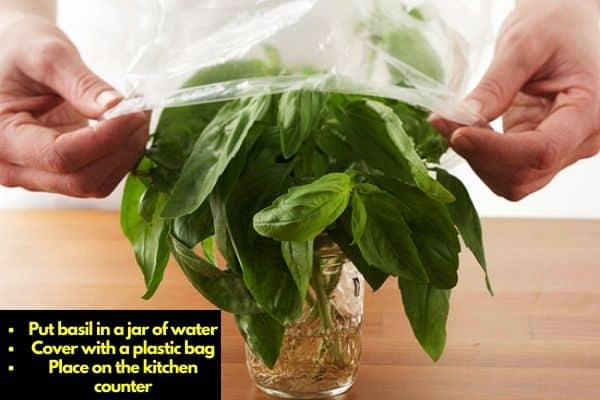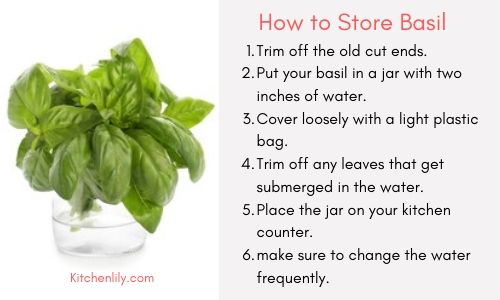Basil can remain fresh at room temperature for a couple of days by simply storing it on your kitchen counter. For long-term storage, freezing is the best option, but you can also dry the leaves and use them for flavoring your recipes.
To store basil and keep it fresh, cut the stems and put them in a jar of clean water. Cover the leaves with a plastic bag to maintain moisture levels and place the jar on your kitchen counter at room temperature for 7-10 days. You can also basil blanch and freeze basil leaves for long.
Best ways to store fresh basil
Basil is a delicate herb that wilts so fast if left unattended. While storing basil, you should never put basil leaves and stems in the fridge because the low temperatures in the fridge turn the leaves black and speed up the decay process.

For long term storage, I recommend freezing basil leaves after blanching them first. Blanching helps the basil leaves to retain their color and flavor before putting them in the freezer.
You can also freeze raw basil as puree and add olive oil to prevent oxidation and slow the puree from turning brown.
Storing Basil at Room Temperature

Once you get your fresh basil from the grocery store, you want to use most of the leaves while they’re still fresh. However, when you have excess basil from your garden, you can store some right at home for later use.
Here’s how to store basil from the garden or grocery store at home:
- Trim off the old cut ends to expose the fresh stem that absorbs water easily to keep basil fresh.
- Put the basil in a jar with two inches of water.
- Cover the jar loosely with a light plastic bag.
- Place the jar on your kitchen counter at room temperature.
- Change the water frequently to keep it clean.
Pro tip: Trim off any leaves that get submerged in the water. This is because the leaves will get slimy and rot due to excess moisture and therefore speed the decay of the entire bunch.
This storage method will keep your basil fresh for 7-10 days and it works to keep different types of herbs fresh.
Freezing Basil Leaves
You can store basil in the freezer if you intend to keep it for a much longer period. Fresh basil can be frozen either raw as a puree or cooked.
For cooked basil, blanching is recommended as you are sure not to overcook it. Blanching also helps to retain the flavor and the green color. Make sure to use olive oil in raw basil to prevent the puree from turning brown.
Here’s how to freeze cooked basil
- Remove the leaves from the stem carefully.
- Wash the basil leaves.
- Put the basil leaves in a pot of boiling water and let them boil for 3-5 seconds.
- Put the boiled basil leaves in ice water to stop the cooking process.
- Dry and portion them depending on how you will use them.
- Put your basil leaves in zipper bags and remove any air inside.
- Put them in the freezer.
Fresh basil leaves will stay fresh in the freezer for 12 months using this method.
See also: How to Keep Cilantro Fresh in Your Kitchen
How to freeze raw basil as a puree
- Remove basil leaves from the stem and wash them
- Put them in a food processor with olive oil (1tbs of olive oil for 1 cup of basil leaves) and puree.
- Put the puree in ice cube tray and freeze for 1-2 hours
- Transfer the frozen basil puree in an airtight container
- Put the container in the freezer
If stored well, basil puree will stay fresh for up to 4 months in the freezer.
Another option is to dry basil leaves in a good dehydrator and store it for later flavor sprinkles in your recipes.
How to know when your basil is going bad
Spoilt basil will have the following traits.
- Dark leaves. Once basil leaves have turned black they automatically become bitter. Get rid of them since you don’t want to spoil your dish with bitterness.
- Slimy basil leaves. This is mostly caused by excess moisture. Get rid of such basil leaves right away as they can cause food poisoning.
- Rotten smell. If your basil starts to have that foul smell it’s definitely unfit for consumption and therefore should be disposed of.
References + Further Reading
- M. Bunning, D. Woo, & P. Kendall, Colorado State University Extension: Herbs – Preserving and Using
- ELSA SANCHEZ, PH.D. and KATHY KELLEY, PH.D., Penstate Extension: Harvesting and Preserving Herbs and Spices for Use in Cooking
